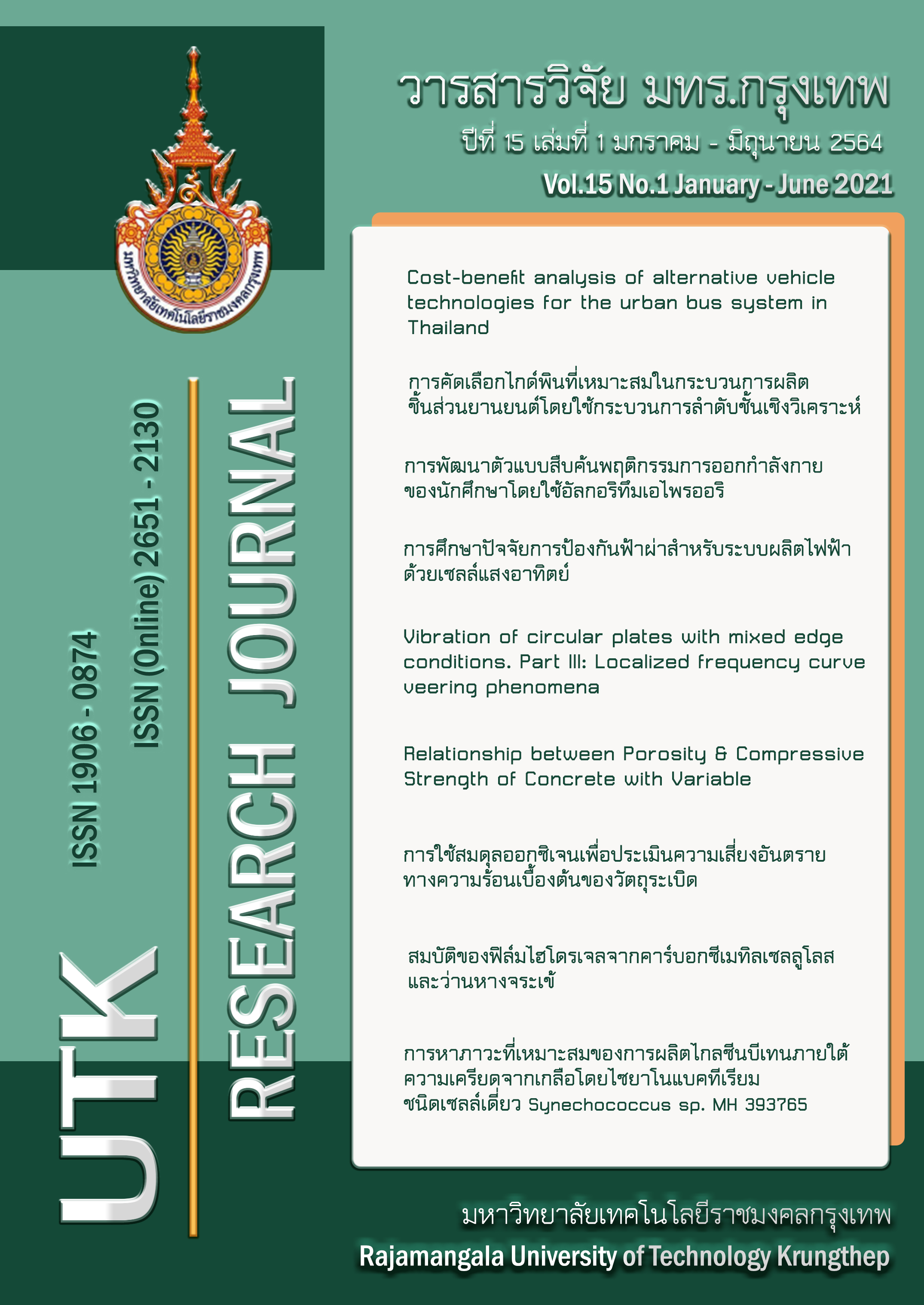Cost-benefit analysis of alternative vehicle technologies for the urban bus system in Thailand
คำสำคัญ:
Bus system, Electric vehicle, Externality costs, Total cost of ownership, Cost-benefit analysisบทคัดย่อ
Environmental impacts from the transport sector have been a critical issue in urban areas for more than two decades. Bangkok, the capital city of Thailand, is one of the biggest megacities in developing countries that is also concerned with this issue. In order to reduce air pollution and mitigate greenhouse gases (GHG) emission, the Bangkok Mass Transit Authority (BMTA) initiated a policy to promote alternative clean technology vehicles by replacing the conventional diesel buses, with compressed natural gas (CNG) buses and electric buses. This paper discusses the economic feasibility for Bangkok, Thailand by the total cost of ownership (TCO) and cost-benefit analysis (CBA) for three alternative technologies for the bus system in Bangkok: diesel, CNG, and electric buses. The TCO of electric vehicles was 8% higher than CNG buses, but it was 10% lower than diesel buses. However, the operating cost of electric buses, including energy costs, operating cost, tax and insurance, was higher than the others. The study showed that in Bangkok’s conditions, the net present value (NPV) for electric buses was 2 times higher than diesel buses, but it was 6% lower than that of compressed natural gas buses, when externality costs were excluded. However, when external costs of pollution were included, the NPV of electric buses was 2.5 times higher than diesel buses and 13% higher than CNG buses.
เอกสารอ้างอิง
Bangkok Mass Transit Authority, 2018. Annual Report 2017, Bangkok.
Bangkok Metropolitan Administration (BMA) and JICA Expert Team. Executive Summary-Bangkok's Road Map for Climate Change 2013–2023. Bangkok; 2015.
Pollution Control Department. Booklet on Thailand State of Pollution 2018. Bangkok; 2019.
Bangkok Mass Transit Authority (BMTA). The suitability of the fuel system for buses of the Bangkok Mass Transit Authority. Bangkok; 2014.
Bangkok Mass Transit Authority (BMTA). BMTA rehabilitation plan 2018. Bangkok; 2018.
Mahmoud M, Garnett R, Ferguson M, et al. Electric buses: A review of alternative powertrains. Renewable and Sustainable Energy Reviews. 2016; 62:673–684.
Laizans A, Graurs I, Rubenis A, et al. Economic Viability of Electric Public Buses: Regional Perspective. Procedia Engineering. 2016; 134:316–321.
Hooftman N, Messagie M, Coosemans T. Analysis of the Potential for Electric Buses. European Copper Institute; 2019.
Nurhadi L, Boren S, Ny H. A Sensitivity Analysis of Total Cost of Ownership for Electric Public Bus Transport Systems in Swedish Medium Sized Cities. Transportation Research Procedia. 2014; 3:818–827.
Sierraclub.org, [Internet], [cited 20 February 2019). Available from: https://www.sierraclub.org/sites/www.sierraclub.org/files/sce-authors/u2387/MBTA%20Bus%20Cost%20Analysis_26%20Oct%202017.pdf
Harris A, Soban D, Smyth BM, et al. Assessing Life Cycle Impacts and the Risk and Uncertainty of Alternative Bus Technologies. Renew Sustain Energy Reviews. 2018; 97:569-579.
Transport & Environment Organization [Internet] Electric buses arrive on time. (cited on 20 April 2019) Available from: https://www.transportenvironment.org/publications/electric-buses-arrive-time
Sheth A, Sarkar D. Life Cycle Cost Analysis for Electric va Diesel Bus Transit in an Indian Scenario. Int J Tech. 2018; 10:105-115.
Ke W, Zhang S, Wu Y, et al. Assessing the Future Vehicle Fleet Electrification: The Impacts on Regional and Urban Air Quality. Environmental Science & Technology. 2016; 51:1007-1016.
Slot Consulting Ltd., 2019, “Cost-benefit analysis,” (cited on 20 April 2019). Available from http://www.slotconsulting.eu/glossary/cost-benefit-analysis/
Ito Y, Managi S. The potential of alternative fuel vehicles: A cost-benefit analysis. Transportation Economics. 2015; 50:39–50.
Gerbec M, Samuel RO, Kontic D. Cost benefit analysis of three different urban bus drive systems using real driving data. Transportation Research Part D. 2015; 41:433–444.
Lajunen A, Energy consumption and cost-benefit analysis of hybrid and electric city buses. Transportation Research Part C. 2014; 38:1–15.
Topal O, Nakir I, Total Cost of Ownership Based Economic Analysis of Diesel, CNG, and Electric Bus Concepts for the Public Transport in Istanbul City. Energies. 2018; 11:23-69.
Buekers J, Holderbeke MV, Bierkens J, et al. Health and Environmental Benefits Related to Electric Vehicle Introduction in EU Countries. Transportation Research Part D 2014; 33:26-38.
Tong F, Hendrickson C, Biehler A, et al. Life cycle ownership cost and environmental externality of alternative fuel options for transit buses. Transportation Research Part D. 2017; 57:287–302.
ดาวน์โหลด
เผยแพร่แล้ว
รูปแบบการอ้างอิง
ฉบับ
ประเภทบทความ
สัญญาอนุญาต
กองบรรณาธิการวารสารวิชาการ มหาวิทยาลัยเทคโนโลยีราชมงคลกรุงเทพ มีความยินดีที่จะรับบทความจากอาจารย์ นักวิจัย นักวิชาการทั้งภายในและภายนอกมหาวิทยาลัย ในสาขาวิชาวิทยาศาสตร์และเทคโนโลยี ได้แก่ สาขาวิชาวิทยาศาสตร์ วิศวกรรมศาสตร์ และสาขาอื่นๆ ที่เกี่ยวข้อง รวมถึงสาขาต่างๆ ที่มีการบูรณาการข้ามศาสตร์ที่เกี่ยวข้องวิทยาศาสตร์และเทคโนโลยี ที่เขียนเป็นภาษาไทยหรือภาษาอังกฤษ ซึ่งผลงานวิชาการที่ส่งมาขอตีพิมพ์ต้องไม่เคยเผยแพร่ในสิ่งพิมพ์อื่นใดมาก่อน และต้องไม่อยู่ในระหว่างการพิจารณาของวารสารอื่น
การละเมิดลิขสิทธิ์ถือเป็นความรับผิดชอบของผู้ส่งบทความโดยตรง บทความที่ได้รับการตีพิมพ์ต้องผ่านการพิจารณากลั่นกรองคุณภาพจากผู้ทรงคุณวุฒิและได้รับความเห็นชอบจากกองบรรณาธิการ
ข้อความที่ปรากฏอยู่ในแต่ละบทความที่ตีพิมพ์ในวารสารวิชาการเล่มนี้ เป็นความคิดเห็นส่วนตัวของผู้เขียนแต่ละท่าน ไม่เกี่ยวข้องกับมหาวิทยาลัยเทคโนโลยีราชมงคลกรุงเทพแต่อย่างใด ความรับผิดชอบด้านเนื้อหาและการตรวจร่างบทความแต่ละบทความเป็นของผู้เขียนแต่ละท่าน หากมีความผิดพลาดใดๆ ผู้เขียนแต่ละท่านจะต้องรับผิดชอบบทความของตนเองแต่ผู้เดียว
กองบรรณาธิการขอสงวนสิทธิ์มิให้นำเนื้อหา หรือข้อคิดเห็นใดๆ ของบทความในวารสารวิชาการ มหาวิทยาลัยเทคโนโลยีราชมงคลกรุงเทพ ไปเผยแพร่ก่อนได้รับอนุญาตจากกองบรรณาธิการ อย่างเป็นลายลักษณ์อักษร ผลงานที่ได้รับการตีพิมพ์ถือเป็นลิขสิทธิ์ของวารสาร






